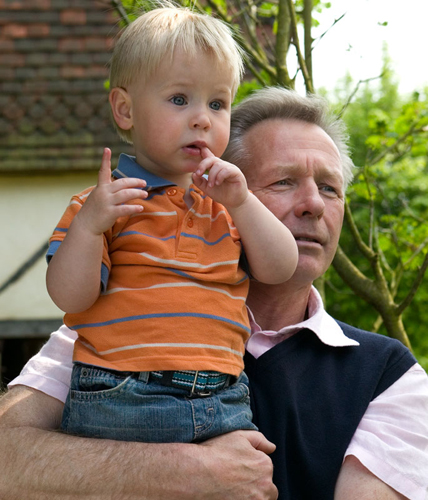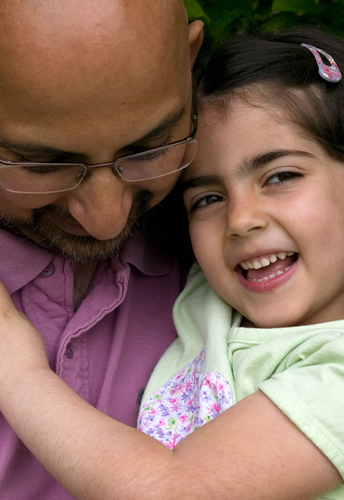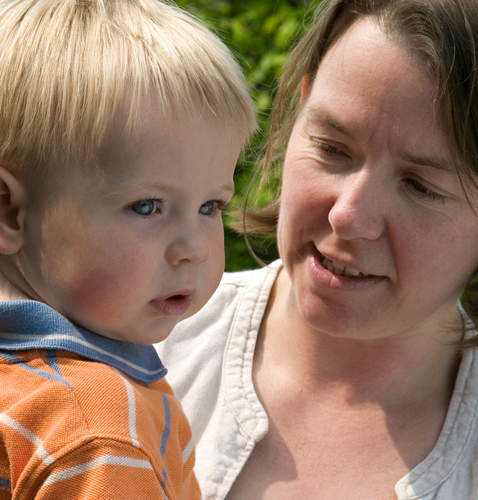By the time your toddler reaches his fourth birthday
he will be well aware of his place in the family, and the people within
it will make up the largest part of his world. This section looks at
some of the broader areas that may affect your toddler’s upbringing and
your parenting choices.
“I missed so much of my children’s childhood because I was working. It is a joy to spend time with my grandson now.”
—“I missed so much of my children’s childhood because I was working. It is a joy to spend time with my grandson now.”
“Our breakup was bitter
since my husband was having an affair. It is still so painful to leave
Mark with his dad and ‘the other woman.’ I feel venomous, but I need to
hold my tongue for the sake of our son.”
—“Our breakup was bitter
since my husband was having an affair. It is still so painful to leave
Mark with his dad and ‘the other woman.’ I feel venomous, but I need to
hold my tongue for the sake of our son.”
Every family is unique and
has evolved as a result of the mix of personal history, cultural
influences, temperaments, talents, and the experiences of those people
within it. The traditional family model of parents with “2.2 children”
is no longer the norm and a family may take several different forms as
it alters over time. Families are anything but homogenous. Blended,
multiracial, and single-parent families are all the norm.

Handling change
Transitions occur
in all families as individual family members, and the unit as a whole,
pass through life stages such as the birth of a baby, the arrival of new
siblings, moving, or a child starting school. These periods, although
positive, can be surprisingly challenging and stressful because the role
each person holds within the family may change completely when the
group as a whole enters a new phase of change. The way that children and
parents have learned to get along with each other may change, too.
During periods of
change, your toddler may not be able to talk about what is worrying him,
but his unhappiness may show in other ways. If you notice any changes
in your child’s behavior (such as sleeping difficulties, bed-wetting,
soiling, or clinginess) offer him reassurance and help him to express
his feelings and worries. Your child is going to look to you for comfort
when distressed. Try to make space for him even during times when you
are facing difficulties yourself. If he is unable to get comfort and
reassurance from you, it will make him increasingly anxious. When change
happens, keeping routines in place can be hard, and may be at odds with
the way your family is evolving. Your toddler will notice, but will
adapt more quickly if your feelings and responses towards him are
unchanged.
Coping with separation and divorce
No parent wants
their relationship to break down but sadly separation and divorce are a
fact of life, particularly in western cultures. In the US, over 50
percent of all marriages end in divorce. The process of divorcing is a
challenge; it is usually painful and often messy, but it is a transition
that many families have to make. You may be separating from someone who
isn’t your child’s birth parent, but nevertheless the change will be
extremely unsettling, especially if your child has a strong bond with
your partner. Whatever your issues as a couple, remember to keep
considering the situation from your child’s point of view and keep the
lines of communication open for your child. Always think about the
long-term effects of your choices and behavior.
While it is tempting to
offer your child false reassurances that “everything will be all
right,” don’t say it will if it won’t. Although the short-term will be
difficult, research suggests that there are no long-lasting negative
implications for the vast majority of children, provided the breakup is
managed considerately. The way the parents conduct themselves is the
single most important factor affecting a child’s ability to adjust in
the short- and long-term. The longer and more distressing the
disruption, the greater the child’s distress and the slower his
adjustment.
When you tell your child
you are parting, keep things simple. Explain what is going to happen.
“Daddy (or Mommy) is not going to live with us any more. He/she will
live in X instead. We will still live here and you will see him/her on
such and such days. Daddy is still your daddy and Mommy is still your
mommy and we both love you very much.” You might need to answer tough
questions such as, “Do you still love each other?” Children do not need
to know all the facts even if you feel a need to talk about them. Keep
the adult issues and your child’s needs clearly separated. All your
toddler wants to know is that you are going to be fine and that you
still love him. Be clear about what will be best for him.
Keeping things normal
Whatever the changes a family may be going through, from moving
to changing schools or jobs, a familiar routine will help everyone
adjust.

Managing emotions
It won’t harm your child
to see you upset, but it is not good for him to see you totally out of
control. If you are feeling vulnerable and can’t control your emotions,
make use of friends or relatives to offer your child some distracting
fun or quiet reassurance. You will need their emotional support, too,
during this difficult time. All toddlers are different, and depending on
their individual personality and temperament, some may show regressive
behavior while others may show self-blame, confusion, irritability, and
increased aggression. Even when you are going through a difficult time,
it is important to keep behavior limits and consequences in place.
Hearing
prolonged arguments or witnessing fighting on a regular basis is not
good for children of any age and they may blame themselves for the
problems that they are witnessing. The under-fours are unable to see the
world from your perspective and think that everything that happens is
because of them. They need repeated reassurance from both parents that
any upset and distress is not their fault. Although a small child may
not have the emotional range or the words to express how he is feeling,
there is no doubt that a relationship breakup will rock his world to the
core.
Accept that your toddler
is going to miss Daddy or Mommy and feel sad. Let him say this and show
his feelings without him having to worry about the emotional effect that
this may have on you. Don’t be tempted to involve your child in your
decision to separate or ask him to choose who he should live with. His
loyalties will be torn and he is far too young to take on such a large
responsibility. It is your decision to make, not his. Avoid using your
children as bargaining tools. It is unfair to them and may be damaging
to your relationship with them in the long term.
Once you have
navigated your way through the maelstrom that follows divorce or
separation, you may feel ready for another serious relationship—and that
relationship may also include children. What is most important for your
child throughout this time is the knowledge that he is still central to
your world.
Stepfamilies
There are many variables
involved in creating a blended or stepfamily. Generally speaking, if
the adult relationship is a happy one and there is adequate time given
to the needs and feelings of each of the children within the new
extended family, then in time the children will adapt. For a toddler,
the important things are to feel loved by you and safe with all the
members of his new extended family.
Of course, in practice,
there will be many mixed feelings—especially if there are a number of
children involved. Meeting new partners is hard for children. Ideally
there will have been a period of adjustment prior to the new
relationship becoming permanent, but this may not always be the case. A
toddler may find it hard to manage his feelings and,
often cannot hold two different thoughts in mind at once. Jealousy,
envy, fear (of loss or separation), anger (at a parent being replaced),
as well as excitement, and happiness can alternate on a minute-by-minute
and hour-by-hour basis; he will react to whichever thought or feeling
is most prominent in his mind at any given time.
Take things slowly.
Your stepchildren’s readiness to accept you will depend on how well they
know you already. Be patient and don’t be tempted to try to take the
place of their parent. Children’s feelings cannot be forced or bought
and their emotions can often be misunderstood. For example, a toddler’s
apparent hostility may be his way of showing uncertainty or expressing
mixed loyalties. Give him time. He needs to learn he can trust you and
that you have his best interests at heart.
As a stepparent you will be
tested—but not necessarily any more than you will be as a parent to your
own children. If you can offer the same degree of warmth, constancy,
and responsive care as would any parent, the rewards of acceptance and
even love may follow. It may be harder as a stepparent to give the
unconditional love that you show your own child, but compassion,
kindness, and the fundamental principles of praise, reward, fairness,
and respect should remain the same.
Coping with bereavement
Some children have to face
the pain of loss, death, or extreme change very early in life. However,
your child’s understanding of what dying means in an abstract sense will
be separate from the sense of grief and loss that he will experience on
losing a beloved relative or a familiar pet. Children do not always
understand or have the words to express how they feel; instead they may
become clingy, anxious, or frustrated. This is your toddler’s way of
asking for help. Don’t shy away from the topic of death. Children may
find it easier to talk about death than adults do; the world of the
imagination is very real for children age 3–4 so it may not seem unusual
to them to imagine they are talking to a person or to a pet that has
died.
The way you choose to
describe death and whether or not there is an afterlife will depend on
your own beliefs, but at some point it is useful to use the words
“death” or “died” and to explain that the person is not coming back.
Talking in euphemisms isn’t helpful for a small child. For example,
telling a child that “Grandma has gone away” will leave him expecting
her to return at some point. He needs to know the reality in order to
make sense of it and adjust to it.
If your child has lost
someone very close to him, it can be helpful to build a collection of
photos and a book of memories to talk through and look at. Try to keep
other things in life constant, such as the family routine, playing
games, and so on. It can be tempting to overcompensate for his loss or
to become overprotective, but the disruption in his routine will only
heighten his anxiety. How those around him manage their own grief and
how available they are for him during this time are the most influential
factors in helping him to grow through his loss.
Being there
It can be hard to explain loss, such as the death of a family
pet, to a very young child, so your reassurance and hugs become even
more important.

Your toddler needs both of you
No matter what you are
going through, remind yourself that your “ex” is still your child’s
parent. Your toddler will still expect to be the center of your world
and is ready to switch to playtime any time. Make sure he still has
plenty of one-on-one time with each parent and allow him to talk about
his mom or dad. Do not say derogatory things about your former partner
in front of your child—this can have a major impact on his behavior and
be very confusing. Always have in mind the long-term effects of your
behavior.